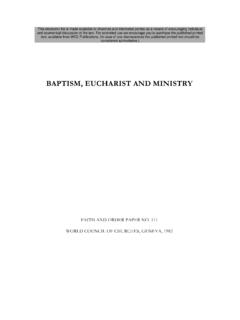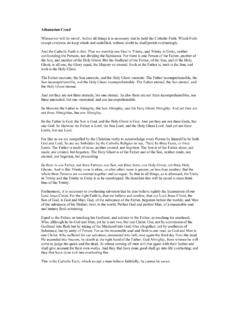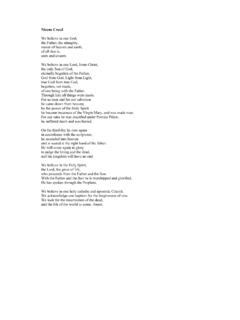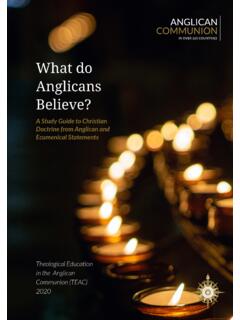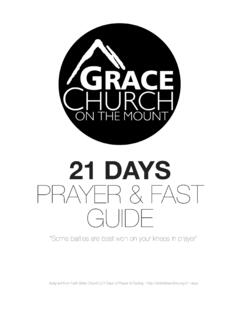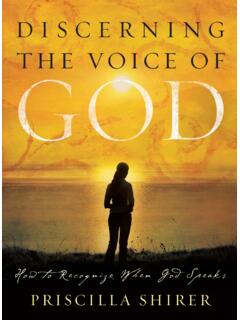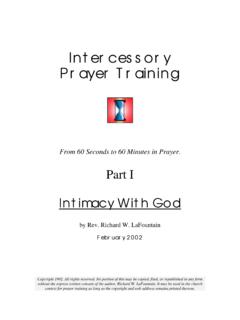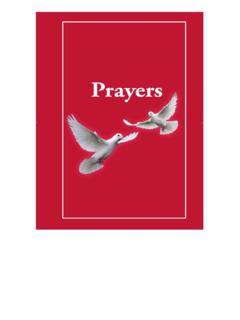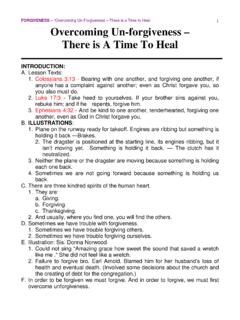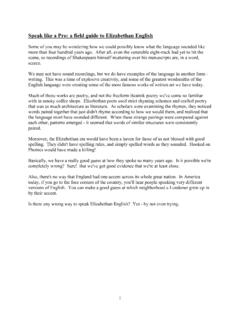Transcription of What is Lectio Divina? - Anglican Communion
1 WORSHIP: Information Sheet: Lectio Divina 1 What is Lectio Divina? Lectio Divina is a contemplative way of reading the Bible. It dates back to the early centuries of the Christian Church and was established as a monastic practice by Benedict in the 6th century. It is a way of praying the scriptures that leads us deeper into God s word. We slow down. We read a short passage more than once. We chew it over slowly and carefully. We savour it. Scripture begins to speak to us in a new way. It speaks to us personally, and aids that union we have with God through Christ who is himself the Living Word. Thomas Cramner in his Homily on Scripture ended it with an exhortation to read it in this way: Let us ruminate, and, as it were, chew the cud, that we may have the sweet juice, spiritual effect, marrow, honey, kernel, taste, comfort and consolation of them.
2 Fr Christopher Jamison, former Abbot of Worth Abbey in Sussex, England in his book Finding Sanctuary writes of three key features of Lectio : The first is that the text is seen as a gift to be received, not a problem to be let the text come to you. The second is that the Lectio tradition teaches us that in order to receive what the text has to offer we must read slowly. The third is that Lectio is a way of prayer. Before reading pray that God will speak to you through the text. During reading, allow the reading to evolve into meditation and then into prayer and finally contemplation. When the reading is concluded, keep some phrase in mind and repeat tit throughout the day so that prayerful reading becomes prayerful living.
3 So, Lectio is not Bible study or even an alternative to Bible study but something radically different. The practice understands Scripture as a meeting place for a personal encounter with the Living God. It is a practice we come to with the desire to be changed at all sorts of levels. It operates very much on the emotional rather than the purely cerebral level. It is perhaps hearty rather than heady. Through it we allow ourselves to be formed in the likeness of Christ; it is about formation rather than instruction. When undertaken in a group setting Lectio is about listening to the experience of others and how that might inform your experience.
4 It is never about pushing a particular view and is certainly not competitive. Rev Lindsay Yates, Chaplin at Westcott House, Cambridge, England encourages the use of Lectio among those training for ordained ministry. Meeting together to engage in group Lectio enables ordinands to learn a practice which can enhance their own personal prayer time and relationship with God. We take it in turns to lead the sessions and so it also equips them with the skill to lead such prayer groups as they go out into parish ministry. She has found it useful to stress the following with people before attempting group Lectio : It is an ancient method of Praying with Scripture.
5 It is based on the belief that Christ is truly present in Scripture and that the reading of Scripture allows God to speak to us. WORSHIP: Information Sheet: Lectio Divina 2 It is a receptive way of praying. It is related to Biblical interpretation and Biblical scholarship can help us with it but when we engage in Lectio we are not concerned primarily with ascertaining theological or doctrinal truths but listening to what God is saying to us through the text. It is not a discussion and no one comments on what another person shares. Group Lectio involves an invitation to share but sharing is not compulsory. In group Lectio we listen to what is shared in the belief that God communicates with us through what others might say.
6 How to enter into Lectio Divina There are a variety of ways you can enter into Lectio Divina we offer two. (1) This Is a set of instructions adapted from Reflections for Daily Prayer Advent 2012 to Eve of Advent 2013 (CHP 2012 Pgs. 6 & 7) by Rt Rev Stephen Cottrell, Bishop of Chelmsford, England. Make sure you are sitting comfortably. Breathe slowly and deeply. Ask God to speak to you through the passage that you are about to read. This is a way of praying that starts with our silence. We often make the mistake of thinking prayer is about what we say to God. It is actually the other way round. God wants to speak to us.
7 He will do this through the Scriptures. So don t worry about what to say. Don t worry if nothing jumps out at you at first. God is patient. He will wait for the opportunity to get in. He will give you a word and lead you to understand its meaning for you today. First reading of the passage: Listen As you read the passage listen for a word or phrase that attracts you. Allow it to arise from the passage as if it is God s word for you today. Sit in silence repeating the word or phrase in your head. Then say the word or phrase aloud. Second reading of the passage: Ponder As you read the passage again ask how this word or phrase speaks to your life and why it has connected with you.
8 Ponder it carefully. Don t worry if you get distracted it may be part of your response to offer it to God. Sit in silence and then frame a single sentence that begins to say aloud what this word or phrase says to you. Third reading of the passage: Pray As you read the passage for the last time ask what Christ is calling from you. What is it that you need to do or consider or relinquish or take on as a result of what God is saying to you in this word or phrase? In the silence that follows the reading pray for the grace of the Spirit to plant this word in your heart. If you are in a group talk for a few minutes and pray with each other.
9 WORSHIP: Information Sheet: Lectio Divina 3 If you are on your own speak your prayer to God either aloud or in the silence of your heart. If there is time, you may even want to read the passage a fourth time, and then end with the same silence before God with which you began. (2) This is a simple approach used in a group situation at the 2008 Lambeth Conference as part of the daily engagement with Scripture suggested this approach. Opening Prayer O Blessed Lord, who caused all Holy Scriptures to be written for our learning: Grant us so to hear them, read, mark, learn and inwardly digest them that we may embrace and hold fast the blessed hope of everlasting life, which you have given us in our saviour Jesus Christ.
10 Amen. 1. One individual reads the passage slowly. 2. Each person identifies the word of phrase that catches their attention (1 minute) 3. Each shares the word or phrase around the group (3-5 minutes, no discussion) 4. Another person reads the passage slowly (From another translation, if possible) 5. Each person identifies where this passage touches their life today (1 minute) 6. Each shares (3-5 minutes, no discussion) 7. Passage is read a third time (Another reader and translation if possible. Or even another language) 8. Each person names or writes: From what I ve heard and shared, what do I believe God wants me to do or be?

